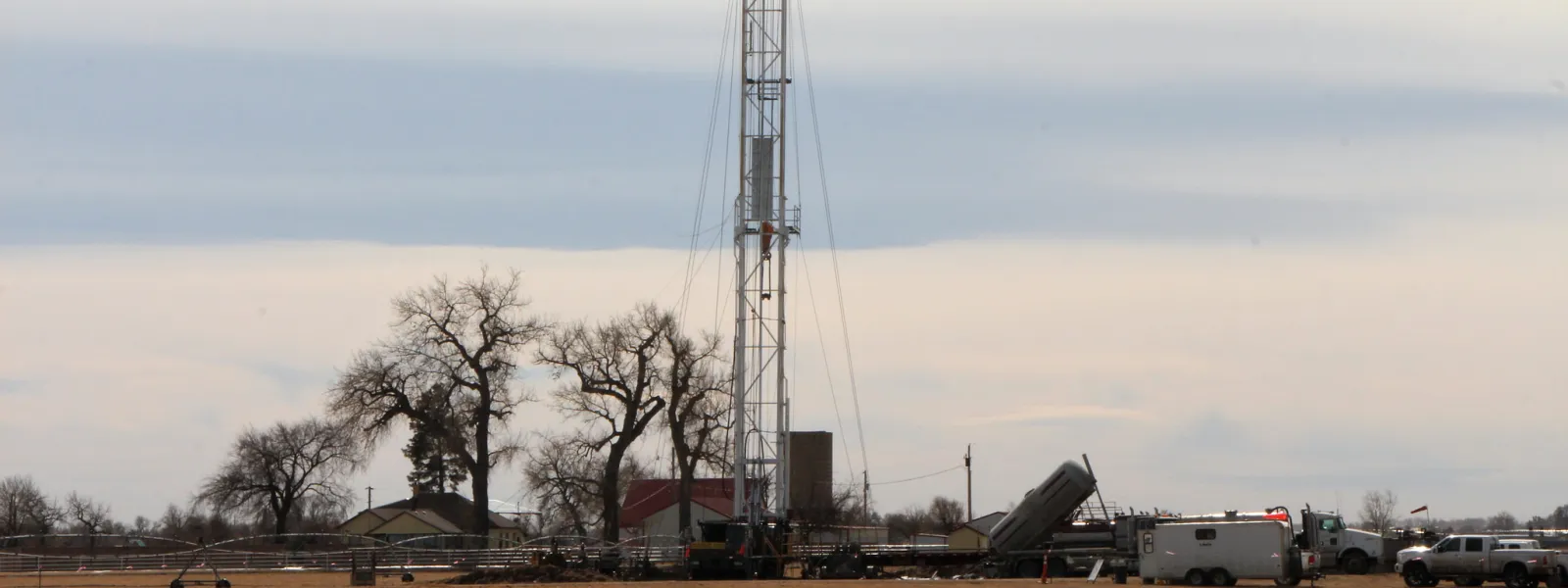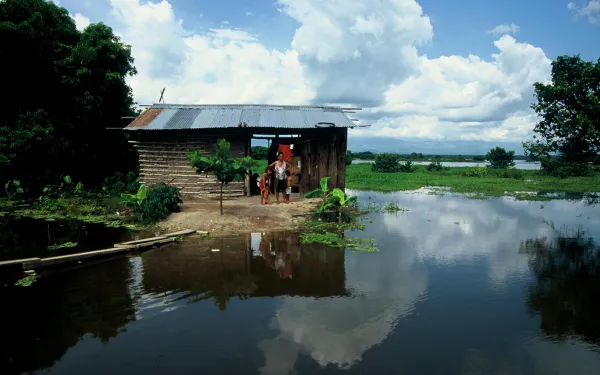
Project
Foto: Andrés ÁngelStopping the spread of fracking in Latin America
“Fracking” is short for hydraulic fracturing, a process used to extract oil and natural gas from historically inaccessible reservoirs.
Fracking is already widespread in the global North, but in Latin America, it is just beginning. Governments are opening their doors to fracking without understanding its impacts and risks, and without consulting affected communities. Many communities are organizing to prevent or stop the impacts of fracking, which affect their fundamental human rights. But in many cases they require legal and technical support.
What exactly is fracking, and what are its impacts?
A straight hole is drilled deep into the earth. Then the drill curves and bores horizontally, making an L-shaped hole. Fracking fluid—a mixture of water, chemicals, and sand—is pumped into the hole at high pressure, fracturing layers of shale rock above and below the hole. Gas or oil trapped in the rock rises to the surface along with the fracking fluid.
The chemical soup—now also contaminated with heavy metals and even radioactive elements from underground—is frequently dumped into unlined ponds. It may seep into aquifers and overflow into streams, poisoning water sources for people, agriculture, and livestock. Gas may also seep from fractured rock or from the well into aquifers; as a result, water flowing from household taps can be lit on fire. Other documented harms include exhausted freshwater supplies (for all that fracking fluid), air pollution from drill and pump rigs, large methane emissions that aggravate global warming, earthquakes, and health harms including cancer and birth defects.
AIDA’s report on fracking (available in Spanish) analyzes the viability of applying the precautionary principle as an institutional tool to prevent, avoid or stop hydraulic fracturing operations in Latin America.
Partners:

Related projects
AIDA presents report at Durban linking climate change to decline of human rights in Latin America
Calls for measures to protect the human rights of the most vulnerable communities. Durban, South Africa – On Wednesday, December 7, 2011, the Interamerican Association for Environmental Defense (AIDA) presented delegates at climate meetings in Durban, South Africa with a report detailing the negative effects of climate change on human rights to life, access to water, health, food, and housing for millions of people in Latin America. “Climate change causes the greatest harm to the human rights of those who are least responsible for greenhouse gas emissions – vulnerable and historically disadvantaged communities such as peasant farmers, indigenous peoples, and the urban poor,” said AIDA staff attorney Jacob Kopas. “Governments disproportionately responsible for historical and current emissions have an international obligation to contribute more to lasting solutions.” The most troubling of the impacts detailed by the report is a dramatic reduction in access to freshwater in Latin America. Increased melting of glaciers, degradation of high-mountain páramo wetlands, erratic weather patterns and severe droughts will limit dry-season access to water for up to 50 million people in the Tropical Andean region by 2050. Other impacts include heavier rains and flooding, which affected 2.2 million people and caused $300 million of damages in Colombia alone in 2010, and the loss of 80% of Caribbean coral reefs due in large part to warming ocean temperatures and ocean acidification. “The parties must understand that the climate change problem can no longer be ignored. We need to act now to help the world’s most affected communities cope with climate change by securing urgent yet attainable solutions like the Green Climate Fund here in Durban,” said AIDA attorney Andrés Pirazzoli, who distributed the report to delegates at the meeting. AIDA backs the Green Climate Fund, which would finance low-carbon technology adoption and adaptation programs in the developing world. AIDA issued the report this week to inform an investigation by the Inter-American Commission on Human Rights (IACHR) on the link between climate change and human rights. The report calls for a binding climate treaty and for the biggest emitters to pay for adaptation and mitigation measures in the developing world.
Read more
A Human Crisis: Climate Change and Human Rights in Latin America
This report shows that global climate change is already negatively affecting the enjoyment of human rights in the Americas and that present impacts will likely intensify in the future. The purpose of this report is not to provide an exhaustive list of all possible climate change consequences. Rather, we provide a summary of those impacts that are best supported by current evidence, most directly attributable to global climate change, and have the greatest potential to affect the human rights of people and vulnerable communities in Latin America. Read and download the report
Read moreBrazil boycotts OAS meeting over Belo Monte Dam
Government refuses to meet affected community leaders at Human Rights Commission. Washington, D.C.—The government of Brazil refused to attend a closed hearing convened by the Inter-American Commission on Human Rights (IACHR) of the Organization of American States (OAS) today, taking a stance that threatens to set a chilling precedent for human rights and sustainable development throughout the Americas. The meeting, scheduled for 2pm, was intended to foster dialogue toward resolving conflict and discuss failures in protecting the rights of indigenous peoples threatened by the proposed Belo Monte hydroelectric dam in the Amazon Basin’s Xingu region of Brazil. Plans for the Belo Monte Dam ignore international protections such as the right to free, prior and informed consent, and jeopardize the health, livelihood and ancestral lands of thousands. “The government’s constant refusal to dialogue and its undiplomatic posturing shows its negligence as it sidesteps the law and ignores the rights of local peoples,” said Sheyla Juruna, a leader of the Juruna indigenous people who are affected by the proposed dam. “I am appalled by the way in which we are treated in our own land without even the right to be consulted on this horrific project.” Brazil’s refusal to attend today’s hearing is only its most recent rebuke to the IACHR, a bulwark of human rights protection in the Americas for more than 50 years. The government has not only ignored an IACHR request to halt the project in order to consult with affected communities, but also withheld its dues and recalled its ambassador to the OAS in protest of the IACHR, according to press reports. Brazil’s intransigence is similar to that of Peruvian strongman Alberto Fujimori’s regime, which took a similar stance against the OAS in 1999. “This flies in the face of the image Brazil promotes of a regional leader and host of important international environmental events like Rio +20 next year,” said Attorney Jacob Kopas of the Inter-American Association for Environmental Defense (AIDA), a nonprofit environmental and human rights organizations representing affected communities. “With this decision, the government is shooting itself in the foot,” said Andressa Caldas, Director of Global Justice. “Should Brazil be granted a permanent seat on the UN Security Council when it undermines human rights institutions like this?” Organizations supporting communities affected by the dam, including the Xingu River Alive Forever Movement, AIDA, Amazon Watch, Global Justice and the Para Society for Human Rights, call on Brazil to comply with its international commitments and engage in a meaningful dialogue on human rights.
Read more